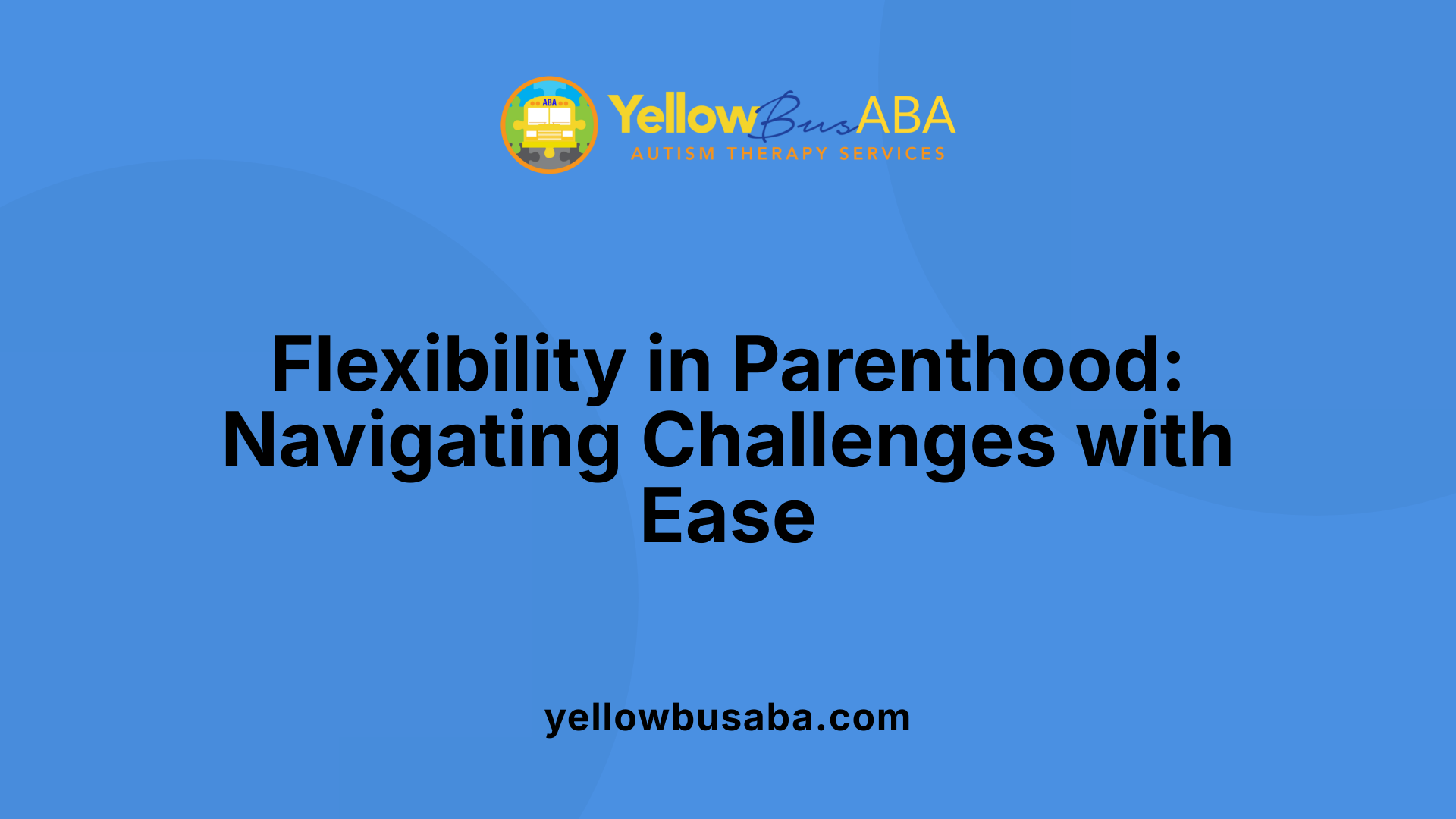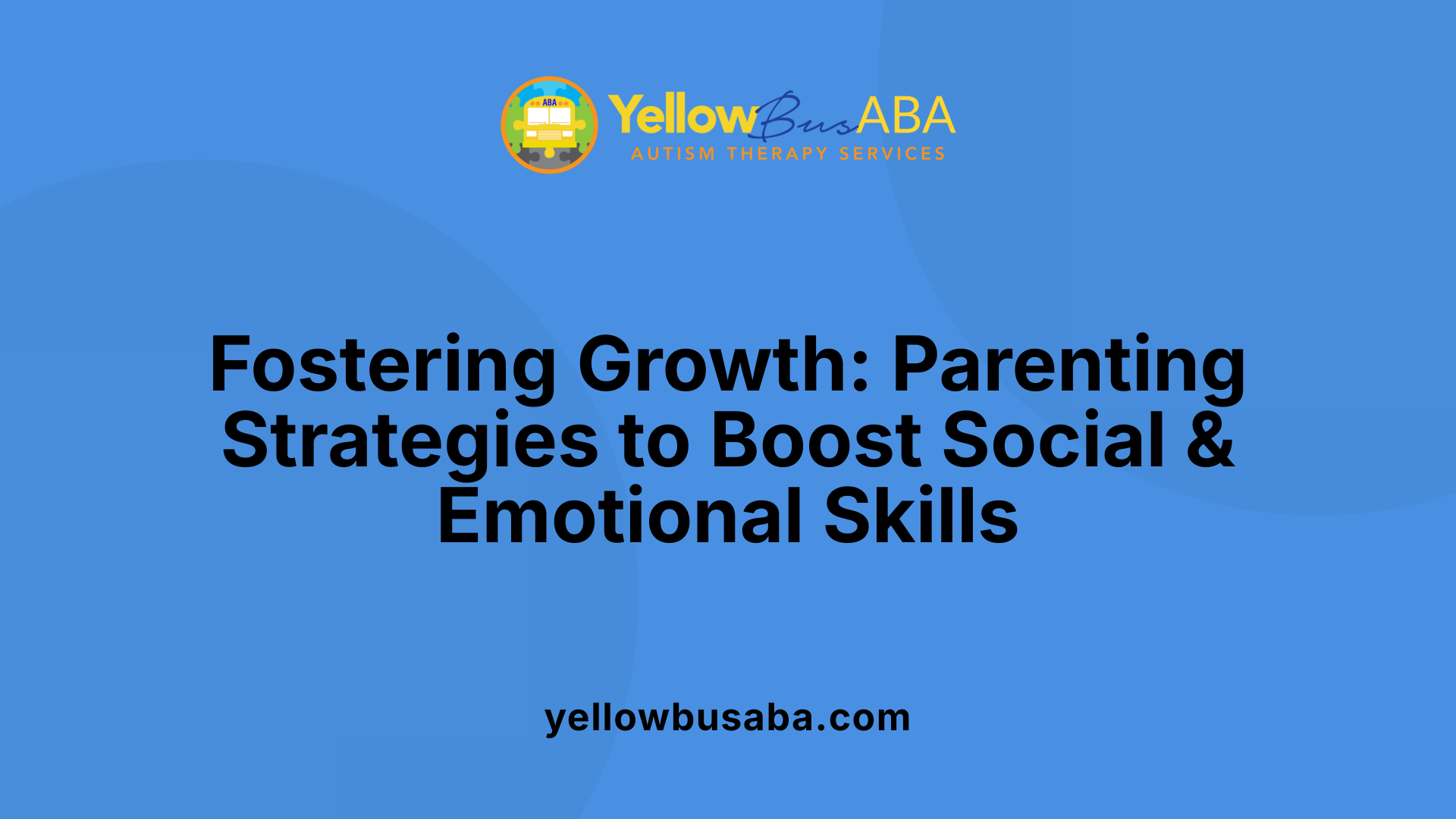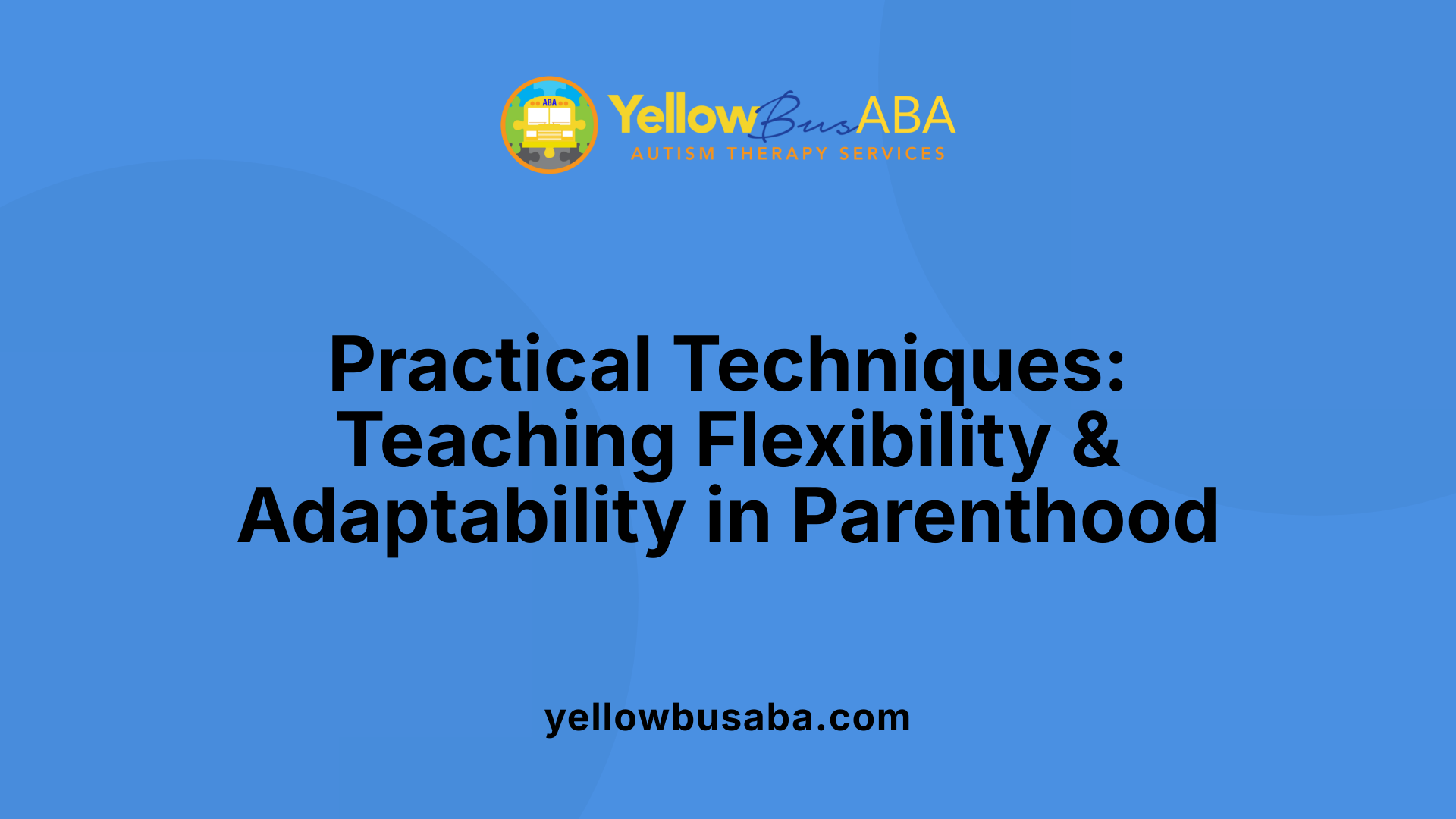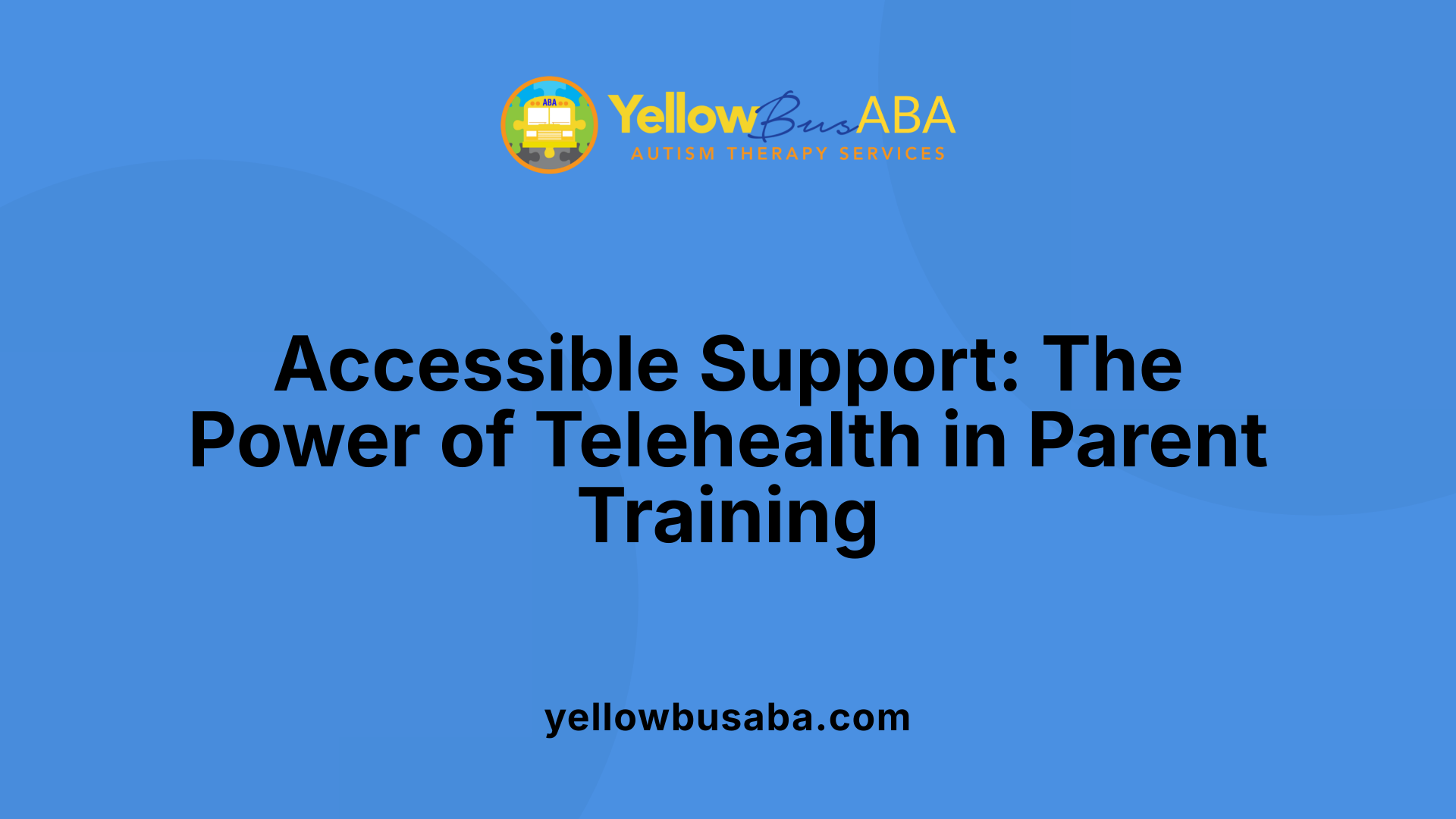Introduction: Parent Training as a Catalyst for Flexibility and Adaptability
Parent training programs serve as vital tools in fostering children's ability to adapt and respond flexibly to life's challenges. By equipping parents with evidence-based strategies rooted in behavioral principles, these programs create nurturing environments where children can develop resilience, emotional regulation, and social competence. This article explores how parent training facilitates these vital skills, contributing to better long-term outcomes for children, especially those with developmental conditions like autism spectrum disorder (ASD).
Core Focus of Parent Training Programs
 Parent training programs aim to equip parents with the skills needed to foster healthier and more supportive family environments. These programs primarily concentrate on three main areas: responding effectively to challenging behaviors, encouraging emotional regulation, and nurturing supportive relationships between parents and children.
Parent training programs aim to equip parents with the skills needed to foster healthier and more supportive family environments. These programs primarily concentrate on three main areas: responding effectively to challenging behaviors, encouraging emotional regulation, and nurturing supportive relationships between parents and children.
A central aspect of parent management training (PMT) involves teaching parents how to respond appropriately to disruptive and problematic behaviors. This includes establishing consistent consequences and positive reinforcement techniques that promote desirable behaviors and reduce negative ones. Parents learn to provide immediate responses that help children understand expectations and develop self-control.
Alongside behavioral strategies, these programs emphasize the importance of emotional regulation. Parents are guided to model calmness and patience, helping children learn to manage their own emotions more effectively. Skills like frustration tolerance and problem-solving are highlighted, enabling children to handle stress and setbacks with resilience.
Moreover, nurturing supportive relationships is a core focus. Parent training encourages practices that strengthen the emotional bond, such as active listening, empathy, and positive engagement. This fosters a sense of safety and emotional security in children, which is crucial for healthy development.
Improving parental responsiveness and empathy is a fundamental goal. When parents are attentive and emotionally attuned to their children, it promotes trust and open communication. This responsiveness influences children's social and emotional well-being, helping them develop better social skills and more adaptive behaviors.
In summary, parent training programs are designed to transform parenting approaches by focusing on behavioral management, emotional support, and relationship building. These elements work together to improve family dynamics and support children’s overall development and mental health.
The Importance of Flexibility for Parents

Why is flexibility important for parents?
Flexibility plays a vital role in effective parenting because it equips parents to handle the inevitable ups and downs of raising children. Parenthood is filled with unpredictable moments, from sudden illnesses to changes in routines, and being adaptable helps parents respond calmly and effectively. When parents practice flexibility, they are better able to manage their expectations and stay resilient in the face of surprises.
Adapting to unexpected circumstances, such as shifts in daily routines or plans, reduces the stress and frustration that often come with trying to control every detail. This approach also minimizes feelings of failure when things don't go as planned, fostering a more positive and supportive family environment.
Moreover, flexible parents are more responsive to their child's changing needs, supporting emotional wellbeing in both the parent and child. This adaptability promotes healthier relationships and contributes to the family's overall wellbeing. In essence, flexible parenting helps parents navigate the complex journey of raising children with patience, resilience, and care, making it a cornerstone of healthy family dynamics.
Enhancing Children’s Social and Emotional Skills through Parenting Strategies

How does parent training support children’s social and emotional skills to enhance adaptability?
Parent training plays a vital role in strengthening children’s social and emotional skills, which are essential for adaptability and resilience. Through specific guidance, parents learn how to foster open communication, model empathy, and create a nurturing environment that promotes emotional understanding.
Effective parent programs emphasize practices such as encouraging sharing of feelings, active listening, and recognizing children's emotional cues. These strategies help children develop self-awareness and emotional regulation skills. For example, mindfulness activities and shared experiences like gratitude journals and kindness challenges help build a supportive family atmosphere. These activities not only promote emotional stability but also enhance social competence.
Creating consistent routines and responding contingently to children’s behaviors are foundational aspects of parent training. When parents provide immediate and predictable consequences, children learn to understand boundaries and develop self-control. Furthermore, modeling positive behaviors, such as patience, respect, and problem-solving, teaches children how to navigate social interactions and cope with challenges.
Building a strong parent-child bond through warmth, responsiveness, and emotional support fosters resilience. Resilient children can better manage stress, adapt to change, and face setbacks confidently. Parent training encourages these practices, helping families develop skills that support emotional well-being and social adaptability.
In conclusion, parent training equips caregivers with tools to create a stable, understanding, and communicative environment. This foundation nurtures children’s social and emotional development, enabling them to respond flexibly to life's demands and develop lifelong resilience.
Approaches to Teaching Flexibility and Adaptability in Parent Training
 Parent training programs employ a variety of strategies rooted in behavioral principles, particularly applied behavior analysis (ABA), to foster flexibility and adaptability in children. These programs teach parents how to use positive reinforcement, modeling, and graded assistance to encourage children to adjust their behaviors and responses according to different situations.
Parent training programs employ a variety of strategies rooted in behavioral principles, particularly applied behavior analysis (ABA), to foster flexibility and adaptability in children. These programs teach parents how to use positive reinforcement, modeling, and graded assistance to encourage children to adjust their behaviors and responses according to different situations.
One central element is teaching parents to recognize and utilize teachable moments—specific opportunities where children are receptive to learning new skills or modifying existing behaviors. During these moments, parents can implement strategies such as offering choices to children or adjusting routines to suit current circumstances, thus promoting a sense of control and autonomy.
Encouraging children to make decisions and participate actively in their routines helps strengthen their problem-solving abilities and emotional regulation. Parents are guided to provide immediate, consistent consequences for behaviors, which helps children understand the link between actions and outcomes, fostering resilience.
Modeling desired behaviors is another effective technique. When parents demonstrate flexible thinking and adaptive responses, children are more likely to imitate these behaviors. Reinforcement plays a vital role here; praising or rewarding flexible behavior encourages children to repeat such behaviors, gradually internalizing adaptive responses.
Graded assistance involves providing support that gradually decreases as the child gains confidence and mastery. This approach allows children to attempt new or challenging tasks with appropriate scaffolding, helping them build foundational skills for more complex adaptive behaviors.
The recent expansion of telehealth services has made these parent training techniques more accessible, especially during the COVID-19 pandemic. Digital tools offer tailored guidance and real-time feedback, which reinforces parents' confidence and competence in applying behavioral strategies.
Overall, parent training enables caregivers to create a nurturing environment that promotes flexibility and resilience. By fostering adaptive routines, encouraging choice, and providing consistent support, parents help children develop the skills necessary to navigate a constantly changing world.
The Role of Telehealth and Remote Parent Training

How does remote or telehealth parent training help improve flexibility and adaptability skills?
Remote and telehealth parent training programs play a crucial role in enhancing children’s flexibility and adaptability. By providing accessible, consistent, and immediate coaching, they help embed behavioral strategies into the child’s natural routines and settings.
These programs encourage parents to practice techniques in familiar environments like the kitchen during mealtimes or at bedtime, which increases ecological validity. This natural setting practice helps children generalize new skills and maintain progress over time.
One advantage of telehealth is the reduction of logistical barriers such as transportation issues or scheduling conflicts. Eliminating these obstacles decreases parental stress and boosts engagement, making it more likely that parents will implement strategies consistently.
Real-time feedback from professionals during remote sessions allows parents to quickly adjust their responses to their child's changing needs. This immediate support reinforces adaptive parenting responses and promotes resilience.
Furthermore, telehealth broadens access to expert guidance, especially for families who might live in remote or underserved areas. It also supports continuous skill development, encouraging parents to refine their approaches and adapt strategies as their children grow.
Overall, virtual parent training strengthens the application of flexible, contextually relevant techniques, which in turn improves children’s social communication, emotional regulation, and general adaptability.
| Benefit | Description | Impact on Children’s Skills |
|---|---|---|
| Accessibility | Overcomes geographical and transportation barriers | Promotes consistent participation and skill generalization |
| Real-time Coaching | Immediate feedback tailored to the home environment | Enhances parent confidence and responsiveness |
| Ecological Validity | Practices embedded in daily routines | Facilitates the transfer of skills to real-life situations |
| Reduced Logistical Barriers | Fewer scheduling conflicts and expenses | Maintains engagement and reduces parental stress |
| Ongoing Skill Support | Continuous guidance and adaptation | Strengthens parent-child interactions and resilience |
These features of remote training make it a powerful tool for supporting children’s developmental needs, especially in developing emotional flexibility and behavioral adaptability.
Effective Methods in Parent Training for Fostering Resilience and Emotional Regulation
How does parent training improve resilience and emotional regulation skills?
Research shows that parent training programs are highly effective in helping children develop better resilience and emotional regulation. These programs teach parents evidence-based techniques such as positive reinforcement, setting clear limits with consistent consequences, and engaging in problem-solving strategies.
By applying these methods, parents can support their children's emotional development every day. For instance, reinforcing appropriate behaviors while calmly addressing misconduct helps children feel more secure and capable of managing stress.
What specific techniques are used in parent training?
Parents learn to provide social and concrete rewards, like praise or privileges, to encourage positive behavior. They are also guided to employ techniques such as time-outs and systematic privilege removal to decrease negative behaviors.
In addition to behavioral strategies, parent training emphasizes observing and recording children's actions, which allows for tailored interventions and tracking progress over time.
Can parent training foster hope, reduce depression, and strengthen family bonds?
Absolutely. Studies indicate that these programs increase resilience, foster hope, and enhance family cohesion. By promoting positive interactions and improving communication, parent training helps reduce feelings of depression among adolescents.
Moreover, strengthening the parent-child relationship through consistent, supportive responses helps children feel understood and secure, further supporting their emotional well-being.
Are there limitations to parent training programs?
While effective in many areas, parent training alone may not significantly reduce all behaviors, such as self-injury frequency. Nonetheless, it remains a critical element of a broader approach for emotional regulation and resilience.
In summary, parent training provides parents with practical tools to support their children’s emotional growth. This, in turn, builds resilience and emotional regulation, equipping children with skills to face life's challenges more effectively.
Parent Training and Development of Adaptive Behaviors in Children with ASD
How does parent training support children with ASD in developing flexibility and adaptability?
Parent training programs, such as those based on behavioral principles, play a crucial role in helping children with autism spectrum disorder (ASD) develop essential adaptive skills. These programs teach parents strategies to reinforce positive behaviors, support social communication, and decrease maladaptive activities.
One of the main focuses of parent training is to equip caregivers with the skills to respond with structure and consistency. This includes using positive reinforcement—like social and concrete rewards—to motivate children and systematically removing privileges if necessary. Such techniques not only help in reducing problematic behaviors but also promote more adaptive responses in daily routines.
Furthermore, by observing and monitoring behaviors, parents can better understand their child's needs and tailor interventions accordingly. This ongoing process supports the child's ability to adapt to new or changing environments, which is vital for social and emotional development.
How does parent training help reduce maladaptive behaviors?
Maladaptive behaviors, such as tantrums, aggression, or repetitive activities, often interfere with a child's learning and socialization. Parent training addresses these behaviors directly by teaching caregivers how to identify their functions and implement behavior management plans. Techniques like planned time-outs, systematic privilege removal, and skill-building activities help decrease disruptive behaviors.
Programs like MATCH-ADTC and other modular approaches provided at institutions like Harvard offer step-by-step guidance, monitoring tools, and practical exercises. These resources enable parents to tackle specific behavioral challenges effectively, leading to a calmer, more manageable environment.
Supporting social interactions and communication skills
Naturalistic interventions, such as Pivotal Response Treatment, JASPER, and Project ImPACT, involve embedding intervention strategies into everyday settings. These approaches encourage children to practice social skills, improve communication, and increase engagement with others.
Caregiver-mediated interventions are especially potent, as they increase the child's exposure to targeted skills across various contexts. Telehealth models further extend access, allowing parents to learn and implement these techniques remotely, which has been particularly useful during events like the COVID-19 pandemic.
How does parent training foster parental confidence and competence?
Training programs reinforce parents' ability to respond effectively to both positive and negative behaviors. By mastering observational and monitoring skills, they become more confident in managing their child's needs. Moreover, focusing on emotional regulation and frustration tolerance during training helps parents remain patient and composed.
This support boosts parental wellbeing, reduces stress, and fosters a more positive family environment. When caregivers feel competent and supported, they’re better equipped to promote resilience in their children, helping them manage stress, adapt to changes, and develop confidence.
| Aspect | Description | Benefits |
|---|---|---|
| Behavioral Strategies | Reinforcing positive behaviors, consistent consequences | Reduce problem behaviors, promote adaptation |
| Social Skills Support | Naturalistic, caregiver-led interventions | Improve communication, social engagement |
| Parental Confidence | Skill development, emotional regulation | Enhance family dynamics, build resilience |
| Adaptability Focus | Flexibility training, problem-solving | Better navigation of daily changes and stress |
How do these training approaches contribute to long-term development?
Overall, parent training equips families with tools that support ongoing development. By fostering understanding, patience, and consistency, it sets the foundation for children to become more adaptable and confident in handling life's challenges. Engaged and informed parents are vital partners in nurturing resilience and promoting positive, sustained behavioral growth.
Behavioral Interventions Rooted in ABA for Teaching Flexibility
How is behavioral intervention, such as ABA, used to teach flexibility and adaptability?
Applied Behavior Analysis (ABA) is a structured and personalized approach that helps children develop greater flexibility and responsiveness to changing situations. It uses specific techniques that reinforce adaptable behaviors and provide alternatives to challenging responses.
Modern ABA emphasizes naturalistic, child-led learning experiences, often incorporating play and everyday interactions, known as natural environment teaching (NET). This approach allows children to practice skills in real-world settings, making their learning more relevant and sustainable.
Relational Frame Theory (RFT) offers a theoretical foundation for ABA, focusing on teaching children how to relate stimuli in various ways. This relational training enhances cognitive flexibility and language skills, leading to improvements in IQ and everyday functioning.
Positive reinforcement plays a crucial role by rewarding flexible and adaptive responses, encouraging children to repeat these behaviors. Functional Communication Training (FCT) helps children develop alternative communication methods to express their needs, reducing frustration and promoting social adaptability.
By integrating these strategies, ABA helps children respond more effectively to diverse situations, fostering resilience and the ability to adjust to new challenges. The tailored, motivating activities within ABA programs ensure progress in developing essential skills for adaptive and flexible behaviors.
Ethical Considerations in Parent Training for Flexibility and Adaptability
When implementing parent management training (PMT) to foster behavioral flexibility and adaptability in children, it is crucial to uphold ethical standards that respect the rights and dignity of families.
One primary concern is respecting family autonomy. Parents should be actively involved in setting goals and providing informed consent before beginning interventions. This ensures that their values, beliefs, and preferences are acknowledged and respected throughout the process.
Cultural responsiveness plays a significant role in ethical practice. Trainers must adapt approaches to align with the family's cultural context, honoring their traditions and perspectives. This sensitivity supports justice and reinforces the dignity of each family, making interventions more effective and respectful.
Using non-coercive methods is essential. Interventions should prioritize positive reinforcement and collaborative decision-making, avoiding any forms of coercion or punishment that could harm the child's well-being or the parent-child relationship. This aligns with principles of beneficence and 'do no harm.'
Data collection and ongoing monitoring are vital to ensure that interventions are effective and appropriate. Respecting confidentiality and privacy when recording progress and behaviors maintains trust and integrity in the therapeutic relationship.
Empowerment and collaboration are at the core of ethical parent training. By fostering a partnership with parents, trainers encourage active participation and shared responsibility. Incorporating strategies like Acceptance and Commitment Therapy (ACT) can support parental well-being, resilience, and stress management, enhancing overall engagement.
Overall, ethical practices in parent training emphasize a balanced approach that combines scientific evidence with respect for individual and cultural differences. The goal is to achieve meaningful, socially valid outcomes for children while respecting family values and promoting parental empowerment.
Supporting Evidence and Research in Parent Training Effectiveness
What evidence supports the use of parent training in teaching behavioral flexibility?
A significant body of research validates the positive impact of parent training on fostering behavioral flexibility in children. Meta-analyses and randomized controlled trials consistently show that behavioral parent training leads to lasting improvements in managing symptoms of Attention Deficit Hyperactivity Disorder (ADHD), reducing disruptive behaviors, and strengthening the parent-child relationship.
These studies reveal that when parents are equipped with strategies such as positive reinforcement, consistent discipline, and routine management, children often demonstrate increased adaptability, improved social skills, and better emotional regulation.
One notable finding is the effectiveness of these programs for young children, where early intervention can set a foundation for future behavioral success. Tailoring parent training to account for cultural and family-specific factors further enhances engagement and outcomes, ensuring that strategies are relevant and practically applicable.
Overall, the research underscores that parent training is not just a short-term aid but a crucial component for promoting behavioral flexibility, supporting long-term behavioral improvements, and fostering resilient, adaptable children.
Conclusion: Embracing Parent Training for a Flexible Future
In conclusion, parent training stands as a critical intervention for promoting flexibility and adaptability in children. By teaching parents evidence-based strategies rooted in behavioral principles, these programs not only improve immediate child behaviors but also foster resilience, emotional regulation, and social competence. The integration of innovative approaches like telehealth expands access and supports continuous learning, while ethical considerations ensure that interventions are respectful and culturally sensitive. The accumulated research affirms the long-term benefits of parent training, making it an essential component in supporting children’s growth and preparing them for a dynamic and unpredictable world. As families embrace these practices, they lay the foundation for children to develop into resilient, adaptable individuals capable of thriving amid life's inevitable changes.
References
- Parent Management Training (PMT) - Child and Family Institute
- A University-Based Social Services Parent-Training Model
- Advances in Supporting Parents in Interventions for Autism ...
- Resilience guide for parents and teachers
- ADAPT: Get Started as a Family - Adaptive Parenting
- Teaching Kids Flexibility and Adaptability - Theatretrain
- Parent Training in Autism Spectrum Disorder: What's in a Name?
- The effectiveness of parent training for children with autism spectrum ...
- How IY Autism Parenting Programs Can Support Families






